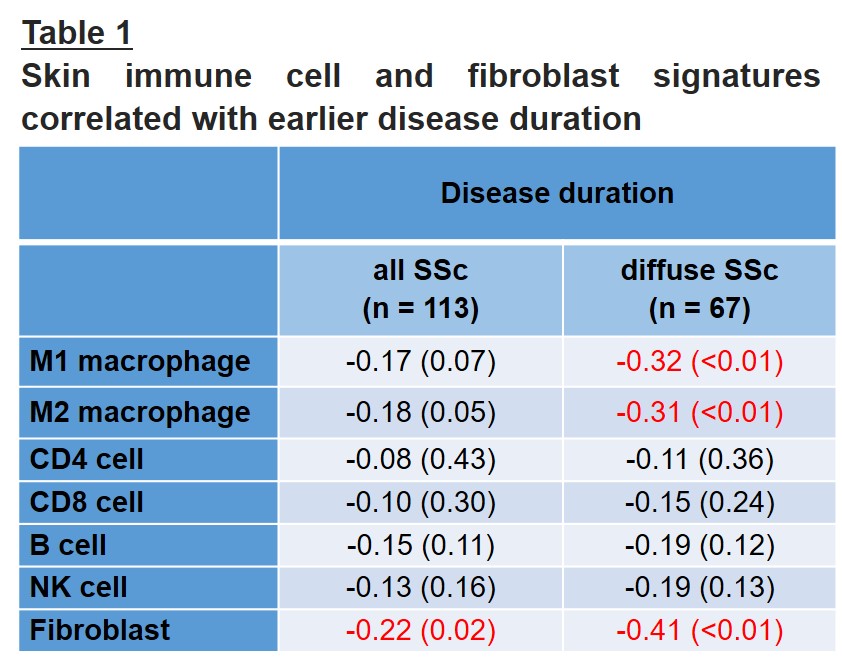Session Information
Date: Monday, November 9, 2020
Session Type: Abstract Session
Session Time: 3:00PM-3:50PM
Background/Purpose: Numerous studies have revealed dysregulated gene expression in the skin of systemic sclerosis (SSc) patients, with varying degrees of inflammatory/immune and fibroblast upregulation. However, the progression of skin gene expression over time and the relationships between skin gene expression and clinical manifestations are incompletely understood. We sought to address these questions through transcriptomic profiling of skin biopsies from a large, diverse group of well-characterized SSc patients, the majority of whom underwent longitudinally-collected biopsies.
Methods: 339 total skin biopsies were obtained from the forearm of 113 SSc patients and 44 matched healthy controls. Disease duration was less than six years at initial biopsy (mean of 2.6 years), and 59.3% of patients had diffuse cutaneous involvement. 105 SSc patients underwent a second biopsy, and 77 underwent a third biopsy (mean of 0.8 years and 1.9 years after baseline biopsy, respectively). Biopsy samples were analyzed by microarray, and normalized transcript levels were analyzed for cell type-specific gene expression signatures comprising 15 cell types. Each SSc patient’s cell type signatures were compared to the average amongst healthy controls.
Results: 67% of baseline SSc biopsies had upregulation of the fibroblast signature, 58% and 53% had upregulation of M1 and M2 macrophage signatures, respectively, and 24%, 31%, 35%, and 31% had upregulation of CD4 T cell, CD8 T cell, B cell, and NK cell signatures, respectively (Figure 1). Fibroblast and immune cell signatures correlated with local skin score and total modified Rodnan skin score (mRSS), with the strongest correlations observed for fibroblast, M1 macrophage, and M2 macrophage signatures. At baseline biopsy, fibroblast and immune cell signatures correlated with shorter disease duration, particularly amongst diffuse cutaneous SSc patients (Table 1). Longitudinal biopsies revealed that immune cell signatures tended to decline over time, particularly in diffuse cutaneous SSc. Immune cell and fibroblast signatures at baseline biopsy predicted subsequent skin fibrosis course, measured as longitudinal mRSS, based on mixed effects linear regression modeling. However, the predictive values were not statistically significant after adjustment for baseline mRSS (Table 2).
Conclusion: Immune cell and fibroblast signatures in the skin of SSc patients were associated with skin thickness and tended to decline over time. Baseline immune cell and fibroblast signatures did not provide predictive significance for the course of skin thickness beyond the information provided by the baseline mRSS.
 Figure 1: Cell type signatures in baseline skin biopsies of systemic sclerosis patients. Each row represents an SSc patient. Each patient’s cell type signature scores were compared to the average amongst the 44 healthy controls. mRSS: modified Rodnan skin score, SSc: systemic sclerosis, Ctrl: healthy control, KC: keratinocyte, NK cell: natural killer cell, DC: dendritic cell
Figure 1: Cell type signatures in baseline skin biopsies of systemic sclerosis patients. Each row represents an SSc patient. Each patient’s cell type signature scores were compared to the average amongst the 44 healthy controls. mRSS: modified Rodnan skin score, SSc: systemic sclerosis, Ctrl: healthy control, KC: keratinocyte, NK cell: natural killer cell, DC: dendritic cell
 Spearman’s rank order correlation coefficients between disease duration and cell type signatures are shown, with p values in parentheses. Red indicates p < 0.05. Disease duration was defined as the time from the first non-Raynaud's symptom.
Spearman’s rank order correlation coefficients between disease duration and cell type signatures are shown, with p values in parentheses. Red indicates p < 0.05. Disease duration was defined as the time from the first non-Raynaud's symptom.
 Mixed effects linear regression models of longitudinal mRSS as a function of baseline cell type signature scores, without vs. with adjustment for baseline mRSS. mRSS: modified Rodnan skin score
Mixed effects linear regression models of longitudinal mRSS as a function of baseline cell type signature scores, without vs. with adjustment for baseline mRSS. mRSS: modified Rodnan skin score
To cite this abstract in AMA style:
Skaug B, Lyons M, Swindell W, Salazar G, Charles J, Vershel C, Mayes M, Assassi S. Large-scale Examination of Longitudinal Skin Gene Expression and Its Associations with Skin Thickness in Systemic Sclerosis [abstract]. Arthritis Rheumatol. 2020; 72 (suppl 10). https://acrabstracts.org/abstract/large-scale-examination-of-longitudinal-skin-gene-expression-and-its-associations-with-skin-thickness-in-systemic-sclerosis/. Accessed .« Back to ACR Convergence 2020
ACR Meeting Abstracts - https://acrabstracts.org/abstract/large-scale-examination-of-longitudinal-skin-gene-expression-and-its-associations-with-skin-thickness-in-systemic-sclerosis/
